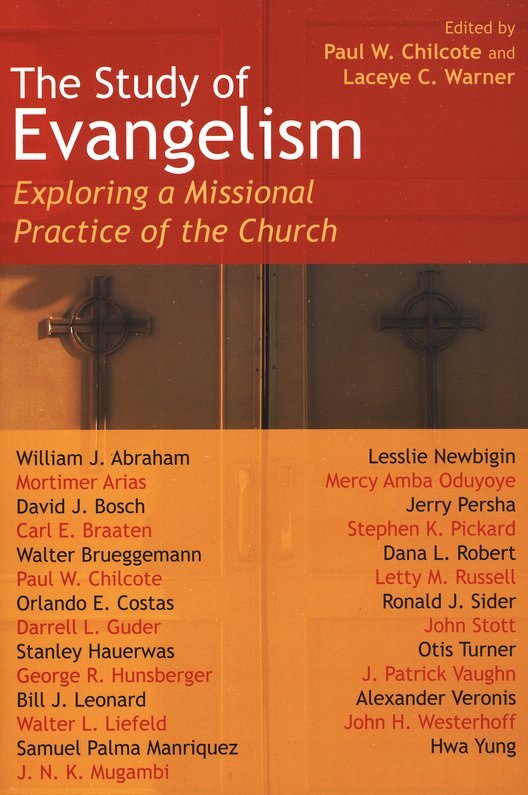Paul Wesley Chilcote and Lacye C. Warner, The Study of Evangelism: Exploring a Missional Practice of the Church. Eerdmans, 2008.
Referenced in: Theology and Practice of Evangelism – Emergent
LifeandLeadership.com Summary
It is difficult to categorize this text. Chilcote and Warner provide a strongly academic development of the philosophical and theological underpinnings of postmodern Christian evangelism in a way that resonateswith both Missional and Emergent perspectives. It is weightier than Brad Kallenberg’s Live to Tell, but addresses many of the same themes. Many of the essays in Chilcote and Warner’s collection may not be of interest to average practitioners, but several are both accessible in their style and almost unsurpassed in their quality. I have highlighted them in the list below.
The author/editors bring together a host of seasoned scholars such as William J. Abraham, Lesslie Newbigin, John Stott, and Walter Brueggeman, alongside a cadre of more recent authors. They present a series of essays divided into six sections and an afterword. The articles are well-titled, allowing the reader to follow a subject of interest. Here are a few of the articles that stood out to me:
Part One: Defining the Ecclesial Practice and Theology of Evangelism – includes three excellent essays. One is by Wiliam J. Abraham which helps stretch our understanding of evangelism beyond proclamation to also include demonstration of the gospel and “the initial formation of genuine disciples of the Lord Jesus Christ.” Orlando Costas, Evangelism and the Gospel of Salvation presents a very holistic, “good news and good works” perspective on salvation. Also valuable is the article by Lesslie Newbigin, Evangelism in the Context of Secularization, and particularly his three suggestions on how Christians can demonstrate the presence of God’s new reality compellingly enough that unbelievers want to inquire (pp. 49ff). This and his article in Part Six are perhaps the best distillation of Lesslie Newbigin on evangelism in the postmodern setting, which has significantly influenced missional/emergent thinking on the subject.
Part Two: Biblical and Historical Sources for the Study of Evangelism – Includes two strong essays, one by George Hunsberger, Is There Biblical Warrant for Evangelism, and another by David J. Bosch’s The Structure of Mission: An Exposition of Matthew 28:16-21.
Part Three: The Study of Evangelism in the World of Theology – Look especially at Ron Sider, Evangelism, Salvation, and Social Justice which distills much of what is found in Sider’s book, Good News and Good Works.
Part Four: The Study of Evangelism Among the Ecclesial Practices – See J. Patrick Vaughn, Evangelism: A Pastoral Theological Perspective.
Part Six: Evangelistic Praxis in Diverse Theological Contexts – See Lesslie Newbigin, Foolishness to the Greeks, which alongside his article in Part One include some of the best insights from his books Foolishness to the Greeks and The Gospel in a Pluralist Society.
Continuing Conversations and the New Trajectories in the Study of Evangelism – Look at God’s Justice and Good News: Looking at the Intertwined Dynamics of Evangelism and Antiracism.
One should expect from this text a clear recasting of evangelism in postmodern terms from a team of international scholar-practitioners. They present excellent critique and provide needed corrections in the theology and practice of evangelism that are not often addressed by others. Like most reactions, however, there is the need for balance. For good comparison, see the resources listed in the Evaluating- Emergent category. The key here is balance, not replacement. Both strains deserve a hearing.
From the Publisher
Christians and communities of faith today are rediscovering evangelism as an essential aspect of the church’s mission. Many of the resulting books in the marketplace, however, have a hands-on orientation, often lacking serious theological engagement and reflection. Bucking that how-to trend, The Study of Evangelism offers thirty groundbreaking essays that plumb the depths of the biblical and theological heritage of the church with reference to evangelistic practice. Helpfully organized into six categories, these broad, diverse writings lay a solid scholarly foundation for meaningful dialogue about the church’s practice of evangelism.
About the Authors
Paul W. Chilcote is visiting professor of the practice of evangelism at Duke Divinity School. His previous books include Recapturing the Wesleys’ Vision and The Wesleyan Tradition.
Laceye C. Warner is associate dean for academic formation and associate professor of the practice of evangelism and Methodist studies at Duke Divinity School.
***For additional information on this resource, including reviews, click the bookstore links. Check the reference at page top or the links below for resource guides on related topics.***
Related Areas
See Other Resources on Evangelism:
See Resources on Over 100 Areas of Ministry Leadership:


